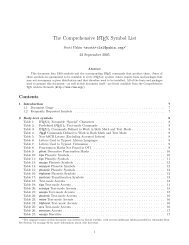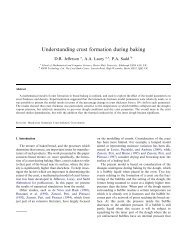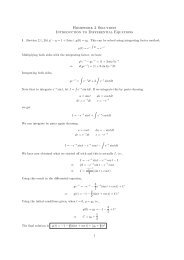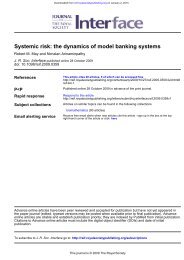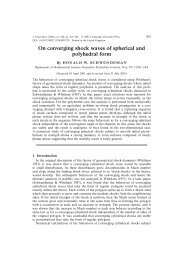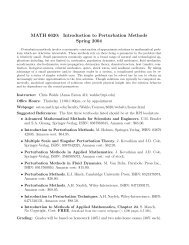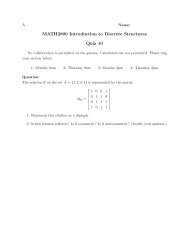ILOG CPLEX C++ API 9.0 Reference Manual
ILOG CPLEX C++ API 9.0 Reference Manual
ILOG CPLEX C++ API 9.0 Reference Manual
You also want an ePaper? Increase the reach of your titles
YUMPU automatically turns print PDFs into web optimized ePapers that Google loves.
IloCplex::SolveCallbackI<br />
Description<br />
See Also<br />
Constructors<br />
Methods<br />
An instance of the class IloCplex::SolveCallbackI can be used to solve node<br />
relaxations during branch & cut search. It allows setting a starting point for the solve or<br />
selecting the algorithm on a per-node basis.<br />
The methods of this class are protected for use in deriving a user-written callback class<br />
and in implementing the main method there.<br />
If an attempt is made to access information not available to an instance of this class, an<br />
exception is thrown.<br />
IloCplex, IloCplex::Callback, IloCplex::CallbackI,<br />
IloCplex::ControlCallbackI, ILOSOLVECALLBACK0<br />
protected SolveCallbackI()<br />
This constructor creates a callback for use in an application for solving the node LPs<br />
during branch & cut searches.<br />
protected IloCplex::CplexStatus getCplexStatus()<br />
This method returns the <strong>ILOG</strong> <strong>CPLEX</strong> status of the instance of IloCplex at the<br />
current node (that is, the state of the optimizer at the node) during the last call to solve<br />
(which may have been called directly in the callback or by IloCplex when processing<br />
the node).<br />
The enumeration IloCplex::CplexStatus lists the possible status values.<br />
protected IloAlgorithm::Status getStatus()<br />
This method returns the status of the solution found by the instance of IloCplex at the<br />
current node during the last call to solve (which may have been called directly in the<br />
callback or by IloCplex when processing the node).<br />
The enumeration IloAlgorithm::Status lists the possible status values.<br />
protected IloBool isDualFeasible()<br />
This method returns IloTrue if the solution provided by the last solve call is dual<br />
feasible. Note that an IloFalse return value does not necessarily mean that the<br />
solution is not dual feasible. It simply means that the relevant algorithm was not able to<br />
conclude it was dual feasible when it terminated.<br />
protected IloBool isPrimalFeasible()<br />
This method returns IloTrue if the solution provided by the last solve call is primal<br />
feasible. Note that an IloFalse return value does not necessarily mean that the<br />
solution is not primal feasible. It simply means that the relevant algorithm was not able<br />
to conclude it was primal feasible when it terminated.<br />
protected void setVectors(const IloNumArray x,<br />
const IloIntVarArray var,<br />
<strong>ILOG</strong> <strong>CPLEX</strong> <strong>C++</strong> <strong>API</strong> <strong>9.0</strong> REFERENCE M ANUAL 221



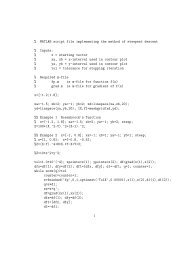

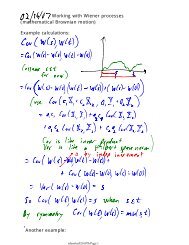

![MATH 1500 Sample Questions Exam 2 1. [3.7] A 10-ft plank is ...](https://img.yumpu.com/43861920/1/190x245/math-1500-sample-questions-exam-2-1-37-a-10-ft-plank-is-.jpg?quality=85)

